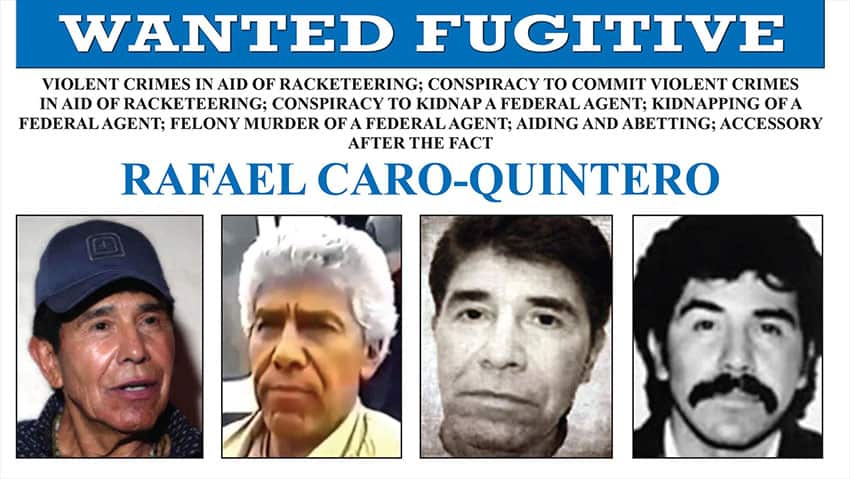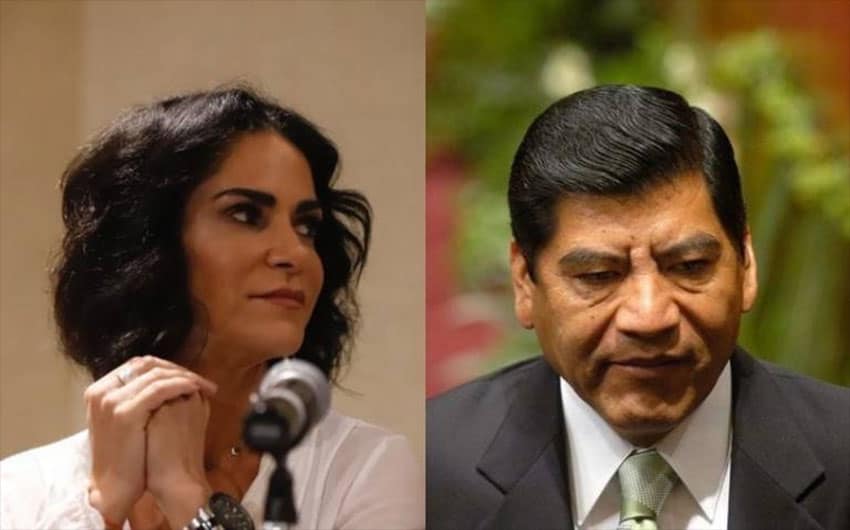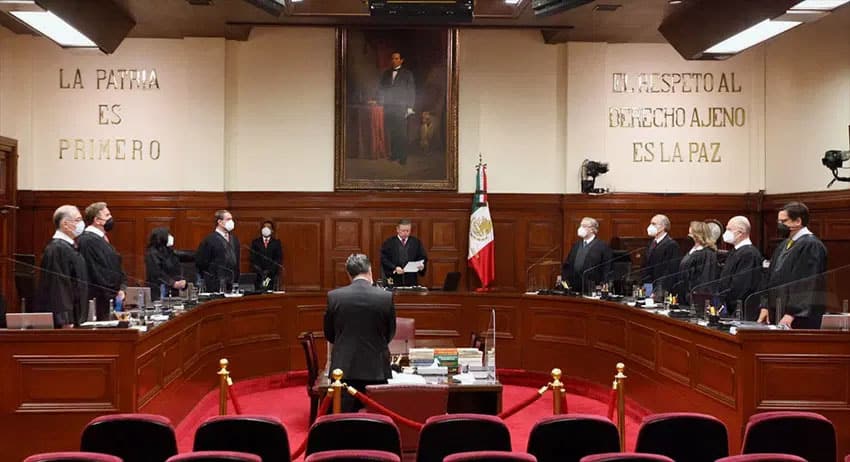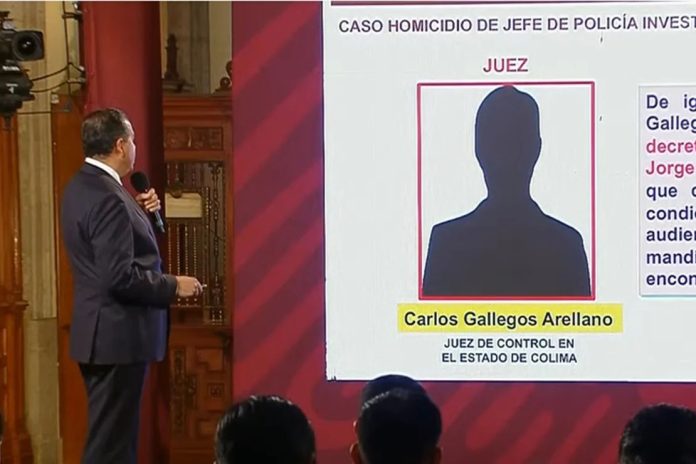The federal government on Friday named and shamed numerous judges who allegedly acted improperly by releasing suspected criminals from custody, even though President López Obrador pledged two days earlier to protect their identities.
At the president’s morning press conference, Deputy Security Minister Ricardo Mejía presented a long list of judges who have “had an impact on impunity and insecurity” by freeing suspects, exonerating them of the some of the charges they faced or handing down other rulings that benefited them in some way.
Among the cases he detailed were ones involving drug lord Rafael Caro Quintero, a presumed criminal known as “La Vaca” (The Cow), an alleged Gulf Cartel leader nicknamed “El Contador” (The Accountant) and a suspected Jalisco New Generation Cartel (CJNG) member known as “El Fantasma” (The Ghost).
La Vaca, El Contador, El Fantasma and Caro Quintero – who was captured in July nine years after he was released from prison due to an administrative bungle – were all freed from custody when they should have been kept behind bars, the deputy minister charged.

He also railed against recent court rulings against Caro Quintero’s extradition to the United States. Mejía pointed out that the other three men were not ordered to stand trial on charges that included homicide, organized crime and kidnapping.
Mexican judges commonly release criminal suspects due to irregularities such as authorities’ fabrication of details about how a suspect was arrested. There have also been countless cases over the years in which judges have taken or allegedly taken bribes in exchange for favorable rulings. Some judges have been found to have ties to powerful criminal organizations such as the CJNG.
Among the other cases Mejía recounted was one involving a suspected serial killer known as “El Monstruo de Tamuín” (The Monster of Tamuín), who allegedly kidnapped, raped and killed at least five women in Tamuín, San Luis Potosí.
The official said that a judge in 2016 ordered his release due to “inconsistencies” in the case against him, even though he had told authorities where he had buried his victims.
“However, the mother of one of the victims obtained a court order [against the judge’s ruling], the case was reopened and he’s currently in a high security prison,” Mejía added.
The deputy minister also spoke about a case involving Kamel Nacif, a businessman known as “El Rey de la Mezclilla ” (The Denim King) for his large textile empire, and former Puebla governor Mario Marín. They are accused of involvement in a 2005 case in which prominent investigative journalist Lydia Cacho was detained and tortured by Puebla police. Marín was arrested in Acapulco early last year, while Nacif was detained in Lebanon a few months later.
In 2020, when both men were still fugitives, two federal judges ordered that freezes on their bank accounts be lifted, Mejía said.
“The judges decided to unfreeze the accounts which meant [giving them access to] …. 800 million pesos,” he said, referring to an amount equivalent to about US $40 million.

One of the other cases Mejía highlighted was that involving former Santa Rosa de Lima Cartel leader José Antonio Yépez Ortiz, who was arrested in Guanajuato in 2020. He acknowledged that Yépez – better known as “El Marro” – was sentenced to 60 years in jail, but emphasized that a judge last year ruled that the crime boss wasn’t required to stand trial for the attempted murder of police.
“He’s detained and sentenced for kidnapping, but charges for other crimes have been removed,” Mejía said. One of the judges he identified is a woman allegedly responsible for “three cases of impunity.”
The deputy minister’s exposure of the judges’ identities comes as the Supreme Court (SCJN) considers proposals to abrogate a constitutional provision that states that mandatory preventive detention must apply to accused perpetrators of certain crimes such as homicide, rape, kidnapping and human trafficking.
The government last week made it clear that it opposes the elimination of the provision, arguing that pre-trial detention is essential to ensure that alleged perpetrators of serious crimes don’t evade justice and continue committing offenses. In a statement, it also said that its support for the constitutional provision allowing pre-trial detention takes into account the fact that detaining suspects often involves a “great effort of the state” in terms of “resources, intelligence and the deployment of forces.”
Mejía reasserted those views on Friday, and claimed that the SCJN doesn’t have the authority to modify the constitution.
“If the court decides to invalidate a constitutional article it would be the first time in the country’s history that the Supreme Court declares itself a constitutional power,” he said.
“It can only nullify laws that violate the constitution,” Mejía said, noting that the federal Congress has the sole power to change the constitution. “The [Supreme] Court can’t legislate [or] invalidate any article of the constitution,” he said.
The deputy minister’s naming and shaming of the judges came after López Obrador on Wednesday signaled that the government would present cases in which it believes that judges have acted improperly. However, the president indicated that the judges wouldn’t be identified so as to not humiliate them.

“There are many cases, very damning cases, but we don’t want to disclose the names of the judges because we would be … humiliating them,” López Obrador said.
“We’re probably going to present cases [of improper conduct by judges but] we’re going to protect the names and we’re going to send all [the information] to the judicial power – the Supreme Court and the [Federal] Judiciary Council, which have done nothing or very little [to address the problem],” he said. “They should be sanctioning judges,” López Obrador added.
While the promise the president made on Wednesday wasn’t kept, the identification of the judges made good on his 2019 threat to name and shame those who regularly free suspected criminals.
López Obrador and other high-ranking members of his government have been openly critical of the nation’s judges, some of whom have ruled against government policies and delivered judgements that have stalled public infrastructure projects.
In May 2021, navy chief José Rafael Ojeda went so far as to say that it seems that the judiciary is the “enemy” of the state in many organized crime cases because judges often act in a way that makes it appear they are on the side of the criminals.
With reports from El Universal and Reforma
